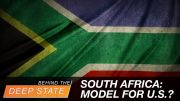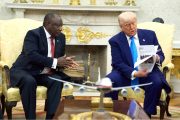“We’ve not called for the killing of white people, at least for now,” said South African political leader Julius Malema recently. “I can’t guarantee the future.”
What Malema — founder and leader of the radical-left Economic Freedom Fighters Party (EFF) — has called for, now, is the seizing of white farmers’ land without compensation. In fact, he introduced the legislation to do just that and helped get it passed in February by the South African National Assembly. Just as strikingly, most American mainstream media are complicit in this persecution via a deafening silence.
And the seizure process has already begun. As the Daily Mail reports:
White farmers in South Africa are trying to flog their land as fears grow that the government is about to start a widespread campaign of seizures.
Union bosses say a record number of properties are for sale but nobody is buying, making the properties effectively worthless.
Agri SA union, which represents mainly white commercial farmers, has warned that such seizures will deter investment, cause job losses, and may rob South Africa of the ability to feed itself.
Meanwhile two farms in the north of the country have reportedly become the first targets for seizures after talks between the government and owners about buying the land broke down.
Akkerland Boerdery, the owners of two game reserves in Limpopo, told City Press that the government asked to buy their land but was only willing to offer a tenth of the price.
When the offer was refused, ministers allegedly sent a letter which said: “Notice is hereby given that a terrain inspection will be held on the farms on April 5 2018 at 10am in order to conduct an audit of the assets and a handover of the farm’s keys to the state.”
Moreover, theTribunePapers.com claims that after the 241-83 February assembly vote to “amend the country’s constitution to allow confiscation of white-owned land,” there “may be other property confiscations of homes, businesses, and even art coming soon.”
Perhaps this is why the organization Genocide Watch has rated South Africa (SA) as being around steps six and seven of the genocidal process, Polarization and Preparation. Step eight is Persecution. And step nine?
Genocide itself.
And the murder rate is already high. As theTribunePapers.com reports, “According to a Genocide Watch report in July 2012, over 3,000 of 40,000 white farmers had been murdered since 1994.”
None of this may trouble Malema, though. Just consider his not killing whites “at least for now” statement, made in an interview with TRT World. When the interviewer said that some people would think this “sounds like a genocidal call,” Malema scoffed, “Ah-ah, cry babies, cry babies!” (video below).
Malema may be an anti-white demagogue, but he does like at least one white creation: socialism. This affinity doesn’t stop him from living a lavish lifestyle (big surprise), but it does explain the spin he puts on his bloodthirsty bigotry. He claims to be warning that there’ll be a revolution he can’t control if things don’t change; translated, however, he’s saying that unless everyone assents to his socialist program, there’ll be blood. As even Genocide Watch (hardly a rightist organization) put it, the “murders of ‘Afrikaner farmers and other whites is organised by racist communists determined to drive whites out of South Africa, nationalise farms and mines, and bring on all the horrors of a communist state,’” related the Daily Mail in 2013.
Below is a video of Malema singing to supporters the song “Shoot the Boer” (a white South African of Dutch or Huguenot descent). Note that since it was declared hate speech, he changed the words to “kiss the Boer,” though he can also be clearly heard saying “shoot to kill.”
Wakanda SA is not.
Of course, this anti-white program, advocated not just by the EFF but also the African National Congress (ANC — Nelson Mandela’s party), threatens to turn South Africa into Zimbabwe. Zimbabwe was a relatively prosperous country until “former President Robert Mugabe implemented his disastrous land redistribution program,” writes theTribunePapers.com. “The economy there collapsed when white farms were forcibly occupied and their owners driven off by persecution, violence, rape, torture, and murder.”
As for the media, just imagine the reaction if a white political leader, anywhere, talked about his nation’s black population the way Malema does about SA’s white one. Try visualizing the response if a white-run government visited SA-like persecution on a non-white group. Yet our media has given more coverage to stories such as the threat to SA’s white rhinos than to its imperiled white people. NewsBusters theorizes that this “may in part be due to embarrassment from the left’s historic support for the ANC.” This is a very charitable judgment. An even bigger factor is likely our Left’s anti-white prejudice — in fact, many leftists act as if SA’s whites deserve what they get.
Many might even say that whites don’t belong in Africa. Yet this only makes sense if one also believes that blacks don’t belong in Europe and that all of us, save American Indians, don’t belong on our continent. Man’s story is partially one of migration.
Yet there’s another factor, one relating to “Apartheid” and which I addressed in 2013, writing:
Most people would never guess it, but the arrival of whites in SA dates back further than that of the ancestors of many of the nation’s blacks. The first Dutch settlers … landed on Africa’s shores in 1652, while many blacks in SA arrived later. After all, since life in “racist” SA was vastly preferable to that in surrounding nations, it had long been attractive to black migrants. In fact, due to this factor and blacks’ higher birthrates, SA’s black demographic has increased 920 percent since 1913; this is the main reason the nation’s population increased from 6 million a century ago to 52 million today, as the white demographic increased only 3.3 million during that period [and now is only 8.4 percent of the population].
The relevant point, however, is that the Dutch settlers found in southern Africa a vast and beautiful land with great wide-open spaces. They then did what Erik the Red did in Greenland, what countless groups have done throughout history: they set up shop — their own shop. Of course, there were Xhosa and Zulus about, but they did their own thing as the Europeans did theirs for the same reason why the Sioux and Cheyenne stayed separate in North America, the Lombards and Alans remained separate in barbarian Europe, or the Smith and Jones households live separately on their block: the default for different groups, with different values and cultures or even just different blood ties, is to live apart. They naturally, instinctively, reflexively maintain “apartness.”
This worked well and was unquestioned for a very long time. But then something happened.
Southern Africa started moving into modernity.
As the Afrikaners and British developed the region, a country known as “South Africa” emerged. And as the blacks were integrated into this European creation — being hired by whites, receiving at least some Western education and learning European languages — they, too, developed a sense of belonging to this “South Africa.”
[So] SA blacks moved into modernity and became part of South Africa, a democracy — and outnumbered the whites 10 to 1. What were the whites to do? Granting the blacks full citizenship rights would usher in the whites’ political, and perhaps physical, destruction. Given this, is it surprising that what always ensured cultural preservation and group safety, that naturally ordained “apartness,” was replaced with the government-ordained policy of “apartheid?”
The opposition to Apartheid reached a fever pitch when I was a teen, and I said then what I say now. While the system had to end, I also stated that the ultimate result of the world’s little plan for SA would be the extermination of the whites. So I drew a logical conclusion: The country should be partitioned.
What happened instead was a pie-in-the-sky utopian scheme that brought SA to where it is now, a situation outlined well in Lauren Southern’s 2018 documentary Farmlands (video below).
I very much hope my teenage prediction will be proven wrong. Thus far, however, it has been unfolding before our very eyes — and the averted eyes of most of the world.
Image: jamespenry via iStock / Getty Images Plus




